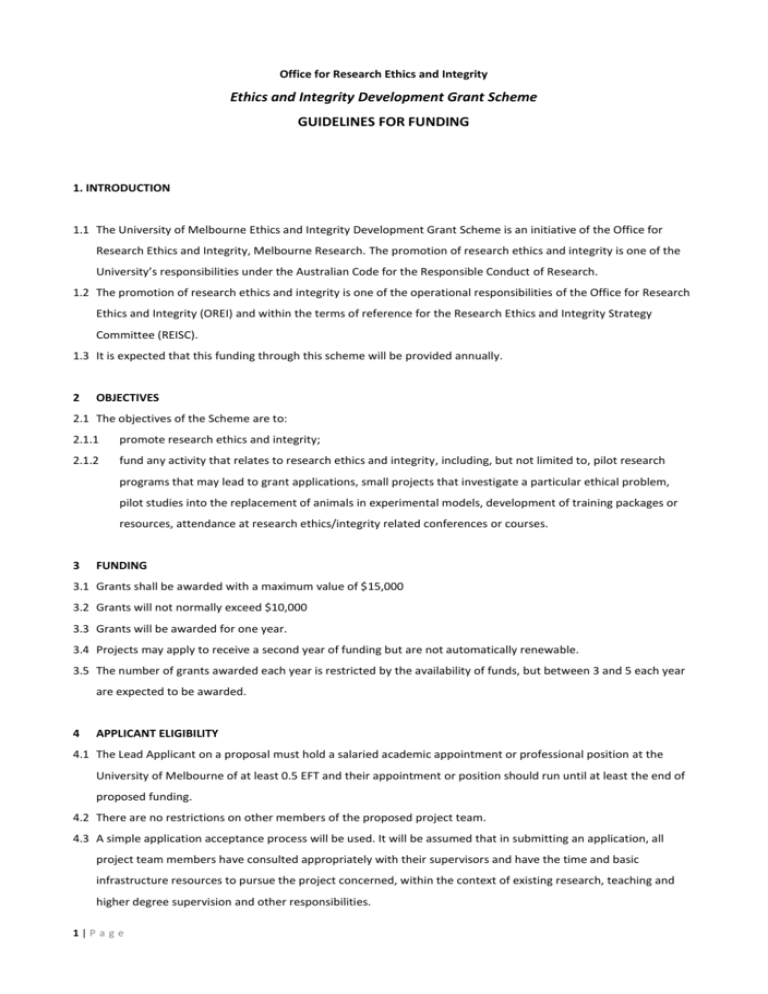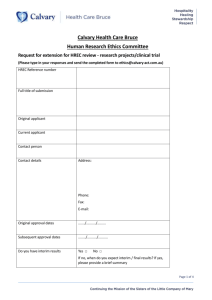EIDG Funding Rules - Office for Research Ethics and Integrity
advertisement

Office for Research Ethics and Integrity Ethics and Integrity Development Grant Scheme GUIDELINES FOR FUNDING 1. INTRODUCTION 1.1 The University of Melbourne Ethics and Integrity Development Grant Scheme is an initiative of the Office for Research Ethics and Integrity, Melbourne Research. The promotion of research ethics and integrity is one of the University’s responsibilities under the Australian Code for the Responsible Conduct of Research. 1.2 The promotion of research ethics and integrity is one of the operational responsibilities of the Office for Research Ethics and Integrity (OREI) and within the terms of reference for the Research Ethics and Integrity Strategy Committee (REISC). 1.3 It is expected that this funding through this scheme will be provided annually. 2 OBJECTIVES 2.1 The objectives of the Scheme are to: 2.1.1 promote research ethics and integrity; 2.1.2 fund any activity that relates to research ethics and integrity, including, but not limited to, pilot research programs that may lead to grant applications, small projects that investigate a particular ethical problem, pilot studies into the replacement of animals in experimental models, development of training packages or resources, attendance at research ethics/integrity related conferences or courses. 3 FUNDING 3.1 Grants shall be awarded with a maximum value of $15,000 3.2 Grants will not normally exceed $10,000 3.3 Grants will be awarded for one year. 3.4 Projects may apply to receive a second year of funding but are not automatically renewable. 3.5 The number of grants awarded each year is restricted by the availability of funds, but between 3 and 5 each year are expected to be awarded. 4 APPLICANT ELIGIBILITY 4.1 The Lead Applicant on a proposal must hold a salaried academic appointment or professional position at the University of Melbourne of at least 0.5 EFT and their appointment or position should run until at least the end of proposed funding. 4.2 There are no restrictions on other members of the proposed project team. 4.3 A simple application acceptance process will be used. It will be assumed that in submitting an application, all project team members have consulted appropriately with their supervisors and have the time and basic infrastructure resources to pursue the project concerned, within the context of existing research, teaching and higher degree supervision and other responsibilities. 1|P a g e 5 NUMBER OF APPLICATIONS Applicants may be involved in only one application as Lead Applicant, but may be participating applicants on other applications. 6 RELATIONSHIP OF THE PROPOSAL TO OTHER PROJECTS Applications which request funds to supplement another current internal University grant, external grant or research contract, the primary purpose of which is the research or promotion of research ethics and integrity, will be excluded from consideration. 7 EVALUATION AND ASSESSMENT 7.1 Assessment Process 7.1.1 Applications will be assessed on a competitive basis by the Research Ethics and Integrity Strategy Committee or a sub-committee formed from its members. 7.1.2 The Selection Committee reserves the right to discuss applications with Deans, Associate Deans (Research), Heads of Department/School, or other senior colleagues, and reserves the right to seek further information from applicants before making a final decision. 7.2 Assessment Criteria 7.2.1 demonstrably focused on research ethics and/or integrity; 7.2.2 research applications must demonstrate significant potential either for future funding by granting bodies or for contributing directly to improvement of some aspect(s) of ethics and integrity at the University of Melbourne; 7.2.3 applications without a research component must demonstrate ability to contribute to improvement in some aspect(s) of ethics and integrity at the University of Melbourne; 7.2.4 8 proposed budget expenditure is aligned with claimed outcomes. APPLICATION PROCESS 8.1 A simplified application process will be used for the scheme. It will consist of one or two pages that describes the proposed activity and the expertise and/or experience of the applicant/s. 8.2 The submission process to be advised closer to the date. 9 KEY DATES Applications due: at the discretion of OREI. Advice re outcome: at the discretion of OREI. Funds available: at the discretion of OREI. Note that for 2013, an extended application round will run from December 2012 until March 2013. Results and funding will be announced and made available in April 2013. 2|P a g e 10. CONDITIONS OF GRANT 10.1 Grant Offers must be accepted in writing by the Lead Applicant and their Head of Department/School. 10.2 The Lead Applicant will be the contact person for all administrative matters to do with the project and is responsible for internal reporting requirements. 10.3 The Lead Applicant must ensure that the research is conducted in accord with University policy, including compliance with the Code of Conduct for Research and policies on human research ethics, animal experimentation ethics, requirements of the Office of Gene Technology Regulator, health and safety and intellectual property. No project may proceed unless the appropriate ethical or other required clearances have been obtained. 10.4 Funding is for one year only. Projects must be completed and funds expended by the end of the year in which the funds were awarded. Extensions to this completion date will be considered only in exceptional circumstances, with a maximum 6 month extension allowed. Where exceptional circumstances exist, a written request must be approved by the Lead Applicant’s Head of Department 10.5 The Lead Applicant must comply with any instructions or conditions in the Offer of Grant relating to approved items of expenditure. 10.6 Unless special conditions are set down by the Committee, the grant should be regarded as a ‘one-line budget.’ The Lead Applicant is responsible for ensuring that the expenditure of the grant is broadly in accord with the budget presented in the application and is consistent at all times with the nature and aims of the specific project approved and the objectives of the Scheme. 10.7 The Lead Applicant will be required to provide written reports and presentations on the progress and outcomes of the project as requested by the Selection Committee from time to time, with a formal final report required on the outcomes of the project within 6 months of the project’s completion. Summaries of projects funded and project final reports may be published. 10.8 Successful applicants are expected to provide appropriate acknowledgement of University support when communicating research outcomes. 3|P a g e









